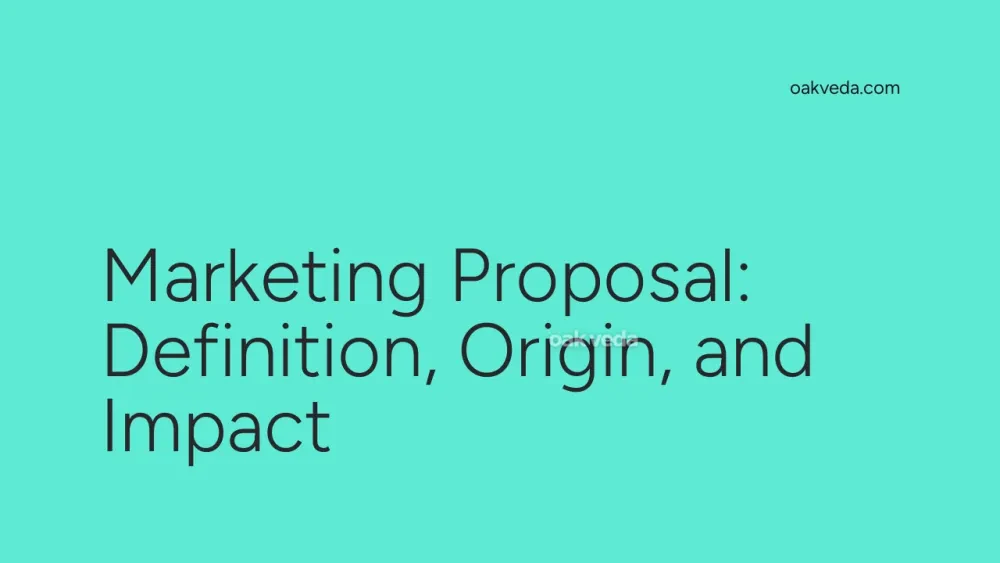
What is a Marketing Proposal?
A marketing proposal is a comprehensive document that outlines a strategic plan for marketing activities. It serves as a roadmap for marketers, clients, and stakeholders, detailing the objectives, strategies, and tactics for a specific marketing campaign or project. This crucial tool helps align expectations, secure buy-in, and provide a clear direction for marketing efforts.
Origin and Development of Marketing Proposals
The concept of marketing proposals has evolved alongside the marketing industry itself. As businesses began to recognize the importance of structured marketing approaches, the need for formal documentation grew. In the digital age, marketing proposals have become increasingly sophisticated, incorporating data-driven insights and multi-channel strategies to address the complex landscape of modern marketing.
How Marketing Proposals Work
A well-crafted marketing proposal typically includes several key components:
- Executive Summary: A concise overview of the proposed marketing plan.
- Situation Analysis: An assessment of the current market landscape and client's position.
- Objectives and Goals: Clear, measurable targets for the marketing efforts.
- Target Audience: Detailed description of the intended demographic.
- Marketing Strategies and Tactics: Specific actions to achieve the stated objectives.
- Budget and Timeline: Projected costs and schedule for implementation.
- Measurement and Evaluation: Methods for tracking success and ROI.
These elements work together to create a cohesive plan that guides marketing activities and demonstrates value to clients or stakeholders.
Types of Marketing Proposals
Marketing proposals can vary based on their purpose and scope:
- Project-based proposals: Focused on a specific marketing initiative or campaign.
- Retainer proposals: Outlining ongoing marketing services over an extended period.
- Digital marketing proposals: Specifically addressing online marketing strategies.
- Integrated marketing proposals: Combining multiple channels and tactics for a comprehensive approach.
Popular Examples of Marketing Proposals
While specific examples are often confidential, successful marketing proposals have led to iconic campaigns such as:
- Nike's "Just Do It" campaign
- Apple's "Get a Mac" series
- Old Spice's "The Man Your Man Could Smell Like" campaign
These campaigns likely started with compelling marketing proposals that outlined innovative strategies and clear objectives.
Impact of Marketing Proposals on Social Media Culture
In the realm of social media, marketing proposals have become instrumental in shaping digital strategies. They help brands:
- Define their social media voice and presence
- Plan content calendars and engagement strategies
- Allocate resources for paid social advertising
- Integrate influencer partnerships into overall marketing plans
Marketing proposals in social media often emphasize metrics like engagement rates, follower growth, and conversion tracking, reflecting the data-driven nature of digital marketing.
Controversies or Debates Surrounding Marketing Proposals
While marketing proposals are generally viewed as essential tools, some debates exist:
- Flexibility vs. Structure: Some argue that rigid proposals can stifle creativity and adaptability in fast-changing markets.
- ROI Measurement: There's ongoing discussion about the best ways to measure and predict ROI in marketing proposals.
- Ethical Considerations: Proposals that push the boundaries of ethical marketing practices can face scrutiny.
How Brands and Influencers Use Marketing Proposals
Brands use marketing proposals to:
- Secure budget approvals from leadership
- Align internal teams on marketing objectives
- Pitch services to potential clients (for agencies)
Influencers, increasingly operating as personal brands, use simplified versions of marketing proposals to:
- Outline collaboration ideas to potential brand partners
- Demonstrate their value and reach to sponsors
- Structure their content creation and posting schedules
Future Trends Related to Marketing Proposals
As the marketing landscape evolves, so do marketing proposals. Emerging trends include:
- AI-driven insights: Incorporating machine learning to predict campaign outcomes.
- Interactive proposals: Using digital tools to create engaging, multimedia proposal experiences.
- Agile marketing proposals: Emphasizing flexibility and iterative approaches.
- Sustainability focus: Including environmental and social impact considerations in proposals.
- Hyper-personalization: Tailoring proposals to individual client needs using big data.
FAQs about Marketing Proposals
-
How long should a marketing proposal be? A: While length can vary, most effective proposals are concise, typically 5-20 pages.
-
Is a marketing proposal the same as a marketing plan? A: A proposal is often a pitch or overview, while a plan is a more detailed execution document.
-
How often should marketing proposals be updated? A: Proposals should be reviewed and updated regularly, especially in dynamic industries.
-
Can small businesses benefit from marketing proposals? A: Absolutely. Marketing proposals can help businesses of all sizes focus their efforts and resources effectively.
-
What's the most important part of a marketing proposal? A: While all sections are important, the executive summary and clear objectives are often considered crucial for initial impact.
In conclusion, marketing proposals remain a cornerstone of effective marketing strategies, evolving to meet the demands of the digital age. As social media continues to dominate the marketing landscape, these proposals serve as vital blueprints for success, guiding brands and influencers through the complex world of online engagement and brand building.
You may be interested in:
- Put on Blast: Definition, Origin, and Impact
- Alt-Text: Definition, Origin, and Impact on Social Media
- Terms of Service (ToS): Definition, Origin, and Impact
- Referral Traffic: Definition, Origin, and Impact
- Fam: Definition, Origin, and Impact on Social Media
- Shook: Definition, Origin, and Impact on Social Media

